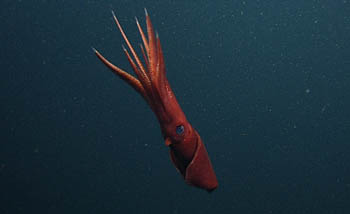
A species of deep-sea squid has been found to have a lot of gay sex. In a study called “A Shot in the Dark: Same-Sex Sexual Behaviour in Deep-Sea Squid,” researchers noted that the squid (Octopoteuthis deletron) are the first spineless masses of invertebrates found to mate equally with males and females — really, with any other squid they see.
It’s really easy to be excited about this, the same way it’s easy to be excited when people find gay penguins (!). Or lesbian koalas! Or gay black swans! Or gay big horn sheep! Or lesbian albatrosses! Bottlenose dolphins and bonobo chimps are the most common examples, possibly because they have a lot of other similarities to humans, and possibly because they are cute, but there same sex behaviour has been documented in over 1,500 species.
Finding “gay” animals is also an easy way to argue against homophobic creationists, because look, if the dolphins/bonobos/penguins are sometimes gay, then it must be OK that people are sometimes gay, too. This argument was used in a Supreme Court decision to strike down sodomy laws in 14 states. Looking at animal behaviour can also lead to an argument that being gay is genetic (though now we have human-based studies for that).
However, using terms that apply to human behaviour don’t fit when applied to animals. According to Lindsay Young, a scientist behind the discovery that many female albatrosses are into chicks, whether or not an animal is gay doesn’t have anything to do with her research: “‘Lesbian,” she told [the New York Times], ‘is a human term,’ and Young — a diligent and cautious scientist, just beginning to make a name in her field — is devoted to using the most aseptic language possible and resisting any tinge of anthropomorphism. ‘The study is about albatross,’ she told me firmly. ‘The study is not about humans.’”
We can’t use human terms to apply to animal research, because the squid isn’t actually bisexual in the way that we think of “bisexual,” it’s just doing what it needs to do to have the greatest chance of survival, which in this case is attempting to have sex with any other squid it sees, regardless of gender (which is difficult to determine in any case. Of the 108 squid captured for the study, scientists could only identify 39 of them.) According to the New York Times,
“Little is known about the details but it seems that the male ejaculates a packet of sperm at the mating partner, and the packet turns inside out, essentially shooting the sperm contained in a membrane into the flesh of the partner, where they stay embedded until the female (if the shooter has been lucky) is ready to fertilize its eggs. If males are the recipient of these rocket sperm, they are just stuck with them. It is the kind of mating that would make a good video game.”
While it’s probably possible to launch on an extended metaphor about how this relates to gay people, I’m not going to. Hendrik Hoving, the researcher behind the findings, “fended off that notion [of gay squid], reiterating that the squid has no discernible sexual orientation, and that a tentacled invertebrate that shoots sperm into its mate’s flesh really has nothing to do with human behavior.”
But there’s something much more important to celebrate when studies like this take place. One of the reasons that we keep “discovering” animals with same-sex behaviour is that for years, scientists would just not mention it (this is called observer bias). According to the New York Times,
“This kind of behavior among animals has been observed by scientists as far back as the 1700’s, but [psychology and neuroscience professor] Mr. Vasey said one reason there had been few books on the topic was that ‘people don’t want to do the research because they don’t want to have suspicions raised about their sexuality.’”
For instance, before Frans de Waal’s Bonobo: The Forgotten Ape was published in 1997, scientists who studied bonobos would never talk about sex, which bonobos engage in almost hourly, and would instead do things like publish a photo of two females having sex and write that they were being affectionate.
The flip side of the bias that makes us read two male penguins with an egg as gay also used to mean that scientists would omit same-sex behaviour from their results, or not even notice it. It’s one thing to be excited about a “gay” squid, but the really exciting thing here is not that the squid are having same-sex sex, but that scientists are talking about it.







